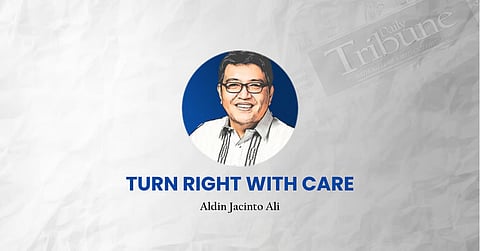
- NEWS
- the EDIT
- COMMENTARY
- BUSINESS
- LIFE
- SHOW
- ACTION
- GLOBAL GOALS
- SNAPS
- DYARYO TIRADA
- MORE

I remember being five or six, woken one night by the sound of my parents’ voices. I wasn’t sure if they were arguing, but I can still see my father, quietly determined, getting ready to go out and join a protest while my mother tried to talk him out of it.
Even then — before I knew what the issue was — I felt that speaking up carried weight. It was something you didn’t do lightly.
Even in noisy times, there’s space for a calm, steady voice. In Islam, speaking out isn’t about who can shout the loudest. It’s about a duty: to encourage what is good and turn away from what is harmful.
The Qur’an says, “Let there arise from you a group inviting to all that is good, enjoining what is right and forbidding what is wrong” (3:104).
That’s not rebellion. That’s responsibility. Raising concerns peacefully is part of the trust God gives us — to stand for justice, but with mercy and restraint.
The Prophet Muhammad once said, “The best form of jihad is a word of truth before a tyrant ruler.”
Notice what he chose: a word of truth. Not a weapon, not a riot. A word spoken with dignity and intention. Protest in Islam isn’t measured by how loud it gets, but by the moral weight behind it.
Quiet strength lasts longer than the loudest noise.
There are moments when frustration spills into the streets. Often the voices aren’t in harmony; sometimes they even compete. That can make it hard to know where truth sits. But the impulse to speak, to be heard, to ask for what’s just — that isn’t foreign to our faith. It’s close to the idea of shura: consultation, the community trying to shape its path, not to defy but to build toward shared well-being.
Still, Islam warns against chaos. The Prophet spoke of fitnah — disorder that harms the innocent. Our Constitution, too, protects the right to assemble peaceably, but never violence. The message is clear: voices should be firm yet restrained, persuasive yet peaceful. Passion and practical prudence make our voices more heard.
Conviction carried with compassion. When we manage that, what we express stops being mere reaction; it becomes conscience in motion.
For Filipino Muslims — long learning how to belong fully while holding on to faith — peaceful expression isn’t rebellion. It’s an act of amanah, a trust. It says: we belong here, and we care enough to speak, not to destroy. Showing up in the democratic space is part of being whole citizens. It’s a way to contribute, to remind, and to stand beside others in shaping a fairer society.
And maybe, in times when anger so quickly turns to harm, the radical thing is to stay calm. To be reflective. To let our gatherings feel less like a roar and more like a kulintang ensemble: distinct notes, different tones, yet forming harmony.
Just as the kulintang doesn’t silence one instrument for another, democracy at its best lets every voice be heard and woven into something larger than any single part.
Faith and democracy alike ask us to take the higher road.
